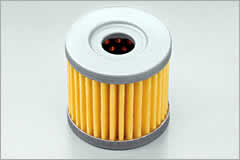Oil Filter, Air Filter, Fuel Filter - How Do They Work? - Vol.203
Cars are expensive even before all the add-ons and repair work that come along with ownership are calculated. Not only do you have to remember the change the oil every so many miles, but mechanics are constantly eating away at your paycheck, recommending repairs and filter changes that you might not actually need.
However, there are some things that your car does need to remain in optimal health and continuing getting you from point A to Point B. Some of the replacements include the oil filter, air filter, and fuel filter that come along with your car which are all extremely important in maintaining the health of your engine. If you haven't changed out these filters in a while, or you're just simply wondering what these filters do and how they work, here is a run down on these essential maintenance functions.

Oil Filter
Oil acts as a lubricant in car engines to prevent the engine from rubbing metal against metal, creating heat and ruining the engine. As you drive, dirt will begin to get into the engine panel and the metal and mix into the oil. That means that your car will be continuously cycling dirty oil through out the engine.
An oil filter acts as a barrier for dirty oil to run through that will filter out any dirt and minuscule metal particles that have mixed in with the oil. The filter looks like a metal canister that is about the size of a coffee cup, and sits underneath your vehicle. Inside these cans is a synthetic fiber that acts a screen to remove particles and dirty. The engine pushes oil into small holes at the top of the filter where it then travels toward the bottom of the device, through the screen, and back up again into the engine. These filters will maintain the purity of the oil up until your next oil and extend the amount of time necessary between oil changes.
Air Filter
As deceiving as the name might sound, the air filter in your car has nothing to do with the air conditioner or the quality of air that you breathe inside the cab. The purpose of the air filter is to keep the engine free from particles in the air so that it can operate at optimal performance.
When you're driving down the freeway at 70 miles per hour, every bug and blemish that hits your windshield and the hood of your car also has the potential of getting into your engine. The air filter is housed inside the hood of your car and prevents these bugs and particles from getting into your engine block. This ensures that the air that is used for the combustion process to keep your car moving is optimal quality and not contaminated. If vehicles didn't have air filters, all of this build up could potentially ruin your engine and cost you serious repairs during the lifetime of your vehicle.
Failing to replace the air filter or using a dirty air filter can be equally as bad. If your car is using a dirty air filter, the engine won't take in as much air as is needed, and some studies have shown that fuel economy could also be negatively effected.
Fuel Filter
Fuel filters are responsible for removing junk that was deposited into the gas tank that could clog your fuel injectors and keep your car from running. The fuel filter acts in conjunction with the two previous filters discussed above and keep your engine in optimal health without particles getting in the way that could cause costly damage.
Depending on the type of fuel system, the fuel filter can be made out of either plastic or metal with two slots for incoming and out coming fuel. If the fuel filter is not maintained, there might be disruptions in the fuel supply causing unwanted jolts in the car when you go to accelerate. Having a dirty fuel filter can also decrease fuel efficiency and cost significantly more in fuel charges.